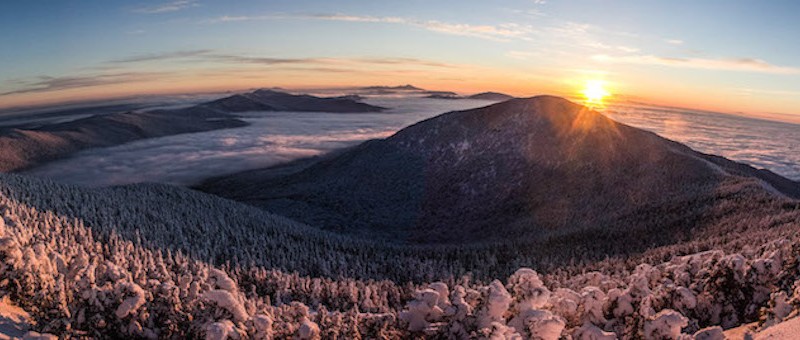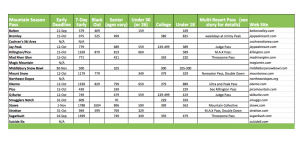6 Ways to Save on Skiing
This year’s season pass deals are better than ever with bonus options to get free days at other resorts in New England, North America and even Chile.
By Lisa Lynn
It used to be that buying a season pass was easy. The only choices you had to make were what mountain you wanted to ski and whether you wanted a seven-day pass or a midweek pass.
No longer.
The good news? This season there are more season pass deals and more ways to combine resort passes than ever, with options to spend not only ski your favorite Vermont resorts and but to get free days at some killer Western resorts (such as Crested Butte, Steamboat or Jackson Hole) with one season pass. The bad news, you may have to hire H&R Bloch to figure out what the best deal is for you.
Which is why we tried to make it simpler here. Keep in mind that many of these passes come with additional discounts, such as a certain percent off at resort retail shops, Nordic ski area privileges and more. It’s worth it to read the fine print on all the passes as often much of it is in your favor. (See the attached chart and visit the resort web sites to find out more.)
Here are the best new season pass deals and how to get the most out of them. Keep in mind early season rate deadlines are coming up fast and in some cases, the number of passes sold are limited.
- Ski around.
If you have always dreamed you could ski the best mountains in North America on one pass, dream no more: It’s come to be. Hallelujah!
The Mountain Collective Pass just added Stowe, Vt. (the only eastern resort) and Taos, N.M to its all-star lineup of resorts such as Jackson Hole, Wyo., Snowbird and Alta, Utah; Mammoth and Squaw, Calif.; and Canada’s Whistler/Blackcomb and Lake Louise. For $399, the pass gets you two days of skiing at each resort and 50 percent off additional life tickets. And if you are really into chasing winter, it is also good at Thredbo, in New South Wales, Australia, Valle Nevado in Chile and Japan’s Hakuba Valley. There are no black out dates but sales are limited. Another sweet option: if you buy a Stowe Seven or Seven-Plus pass, you automatically get 50 percent off lift tickets at any of the other Mountain Collective resort.
If you plan to ski around New England and want to head out west as well, the Multi Alpine Experience (M.A.X.) pass lets you ski up to five days at each of 22 mountains across the U.S. and Canada. In New England, the M.A.X. pass is good at Stratton, Killington and Pico in Vermont, as well as Sugarloaf and Sunday River in Maine, Loon, N.H. and Mont Tremblant, in Quebec. Western resorts include Big Sky, Mont., and in Colorado, Winter Park and Steamboat. If you already have a season pass at Stratton or Killington, you can add on an adult M.A.X. pass for $249. Otherwise, the cost for an adult is $699, with no blackout days. This means you could, conceivably, travel the country and ski 110 days, at a cost per day of $6.35. But that would also mean spending five days skiing in West Virginia.
Another good option, the Ultra Pass gives you unlimited, no-black-out-days skiing at Okemo, Vt., Mount Sunapee N.H. and Crested Butte, Colo., plus three days at Killington for $1,811.54 for an adult. If you don’t plan to go to Crested Butte, you can get all the other benefits of the Ultra Pass with a Peak Pass for $1,419.
If you are not planning on loading your gear on a plane but want to explore the east, the Nor’easter Pass includes unlimited skiing at Mount Snow as well as at New Hampshire’s Attitash, Wildcat and Crotched Mountain and Big Boulder and Jack Frost in Pennsylvania.
- Ski two mountains for the price of one.
A number of Vermont resorts are offering discounts on a dual-mountain pass. For about $100 more than you would spend on a Jay Peak season pass, a Judge Pass, for instance, lets you ski both Jay Peak and Burke. Killington’s pass includes skiing at Pico. College students have until November 4 to get a $359 Threesome pass to Sugarbush (Mt. Ellen and Lincoln Peak) and Mad River Glen. You don’t have to be in If you are between 18-26, the Double Down will give you access all season to Stratton and Mount Snow for just $379, as well as $40 mid-week buddy tickets. Bromley also has a deal with Jiminy Peak that gives Bromley season pass holders half price tickets midweek at the Massachusetts resort.
- Black out and save.
Nearly every Vermont resort offers mid-week passes at up to half off the regular pass price. Then there are the “black out” season passes that still let you ski weekends but keep you off the slopes when they are most likely to be crowded. Killington’s Blackout Pass, for instance, cuts out 17 days (a week at Christmas, mid-January and mid-February) but gives you a pass for just $879 versus the full-season $1,269. Stowe’s Seven pass blacks out Christmas Week and Presidents Day weekend but costs $174 less than the Seven Plus unrestricted pass.
If you can live without skiing Saturdays and blacked-out days, Okemo’s Sunday Plus pass is $666.74 and includes skiing at Mount Sunapee and five days at Crested Butte, Colo., too. At Bolton, if you forego Saturday skiing you can get a season pass for $469. And if you just want to ski just on Sundays, Stratton’s Sunday Pass is $319 (subject to blackout days).
- Go small and win big.
Say you are learning to ski, or teaching young kids. You may not need 2,500 vertical feet and umpteen peaks to have a great time. Places like Bolton, Cochran’s, the Middlebury Snow Bowl and Suicide Six may not have the infrastructure of the larger resorts, but they almost never have crowds and on busy weekends, you can often still find powder staches in the woods. Best, season pass prices are about half what the larger mountains charge. An added benefit, both Cochran’s and Bolton offer night skiing and Bolton’s night racing league is a blast.
The other options are to think about skiing just one side of the larger mountains. Pico’s season pass, for instance, is a lot less than the Killington/Pico combined pass. Sugarbush offers a Mount Ellen-only pass that’s less than half the cost of the full-resort pass. Smuggler’s Notch has a Morse Mountain pass that is also about half off its full season pass.
- Take advantage of your age
If you are an adult age 30 to 60, you may be S.O.L. If not, there is a deal for you. To start with, if your kids are under 6 years old they can ski for free (or for very little) at many resorts. This year, Sugarbush extends free skiing to all kids under 12 whose parents buy a seven-day pass. Fifth graders—Vermonters and visitors alike—can get a coupon book of free lift tickets with a Ski Vermont Fifth Grade Passport (www.skivermont.com). The catch: to use the coupons an adult has to buy a ticket and there are blackout days.
If you are planning to ski with kids, or even as a couple, look into the various family passes. Each resort has slightly different options. Stratton, for instance, offers a $200 discount on the second adult in the family who buys a season pass.
Vermont has 23 colleges and universities and college students probably get the sweetest deals around, with season passes that start as low as $229 (Jay Peak, Smuggler’s Notch) and rarely go about $400. At many areas, college students can also lock in their passes as late as November, a few weeks after the early bird passes go off sale.
College students also get access to more mountains, thanks to things like the Double Down pass, Sugarbush’s Threesome Pass and Okemo’s 4.0 College Pass, which gives access to Mount Sunapee and Killington too. Resorts have also recognized that millennials who are still paying off college debt could use a break and are eager to woo this cohort before they start having families of their own. If you are under 30, you can take advantage of special passes (under $700) at many of the major resorts and if you are under 26, can use the Double Down Pass for both Stratton and Mount Snow.
Resorts also want to keep “senior” skiers, which, at most resorts, means those over 65. This year Jay Peak lowers its definition of a “senior” skier to 60 and Sugarbush drops its “senior” status from 75 to 65. Many resorts offer graduated prices that go down as you age. At Killington, if you are over 80 you can get a “super senior” pass for $80. At Smuggler’s Notch, “seniors” start at age 70 but they only pay $70 for a season pass (or $20 if you bought before September 7). At Bolton, if you are over 75, a season pass is $49. See, there are some advantages to getting older.
- Calculate day ticket costs vs. a season’s pass.
The biggest conundrum each season is trying to decide if you will ski enough days to make a season’s pass worth it. If you ski more than 15 days, at most resorts a season’s pass will pay for itself.
That said, ski resorts do offer a number of ways to save on day tickets. Buy Smuggler’s Notch’s Bash Badge ($119 early season rate) and each day ticket after is only $30. Stowe’s Evolution card guarantees you always get the lowest rate which with fluctuating early season day ticket prices can be a real boon and it lets you buy online and bypass the ticket booth. Stratton offers pre-season ticket sales at bargain prices. For instance, during an August sale you could have bought three anytime tickets for $165. The Stratton X2 card also comes pre-loaded with a free day.
As we went to press, many of the day ticket prices were not yet available. Resorts would rather have you lock in a season pass before you can calculate if it’s worth it.
Chances are, if you don’t get a season’s pass you’ll be less likely to hit the slopes on those days when the drizzle in town was powder on the mountain, so we always say “go for it.”


